Rectified 6-simplexes
 6-simplex |
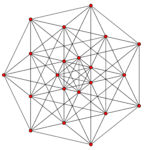 Rectified 6-simplex |
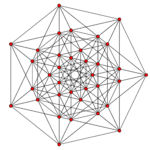 Birectified 6-simplex |
| Orthogonal projections in A6 Coxeter plane | ||
|---|---|---|
In six-dimensional geometry, a rectified 6-simplex is a convex uniform 6-polytope, being a rectification of the regular 6-simplex.
There are three unique degrees of rectifications, including the zeroth, the 6-simplex itself. Vertices of the rectified 6-simplex are located at the edge-centers of the 6-simplex. Vertices of the birectified 6-simplex are located in the triangular face centers of the 6-simplex.
Rectified 6-simplex
E. L. Elte identified it in 1912 as a semiregular polytope, labeling it as S16. It is also called 04,1 for its branching Coxeter-Dynkin diagram, shown as ![]()
![]()
![]()
![]()
![]()
![]()
![]()
![]()
![]() .
.
Alternate names
- Rectified heptapeton (Acronym: ril) (Jonathan Bowers)
Coordinates
The vertices of the rectified 6-simplex can be most simply positioned in 7-space as permutations of (0,0,0,0,0,1,1). This construction is based on facets of the rectified 7-orthoplex.
Images
| Ak Coxeter plane | A6 | A5 | A4 |
|---|---|---|---|
| Graph | 
|
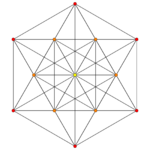
|
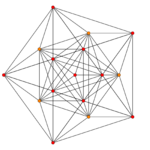
|
| Dihedral symmetry | [7] | [6] | [5] |
| Ak Coxeter plane | A3 | A2 | |
| Graph | 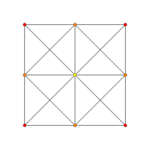
|
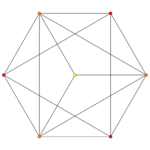
| |
| Dihedral symmetry | [4] | [3] |
Birectified 6-simplex
| Birectified 6-simplex | |
|---|---|
| Type | uniform 6-polytope |
| Class | A6 polytope |
| Schläfli symbol | t2{3,3,3,3,3} 2r{35} = {33,2} or [math]\displaystyle{ \left\{\begin{array}{l}3, 3, 3\\3, 3\end{array}\right\} }[/math] |
| Coxeter symbol | 032 |
| Coxeter diagrams | |
| 5-faces | 14 total: 7 t1{3,3,3,3} 7 t2{3,3,3,3} |
| 4-faces | 84 |
| Cells | 245 |
| Faces | 350 |
| Edges | 210 |
| Vertices | 35 |
| Vertex figure | {3}x{3,3} |
| Petrie polygon | Heptagon |
| Coxeter groups | A6, [3,3,3,3,3] |
| Properties | convex |
E. L. Elte identified it in 1912 as a semiregular polytope, labeling it as S26. It is also called 03,2 for its branching Coxeter-Dynkin diagram, shown as ![]()
![]()
![]()
![]()
![]()
![]()
![]() .
.
Alternate names
- Birectified heptapeton (Acronym: bril) (Jonathan Bowers)
Coordinates
The vertices of the birectified 6-simplex can be most simply positioned in 7-space as permutations of (0,0,0,0,1,1,1). This construction is based on facets of the birectified 7-orthoplex.
Images
| Ak Coxeter plane | A6 | A5 | A4 |
|---|---|---|---|
| Graph | 
|
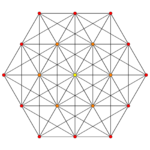
|
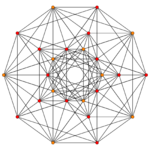
|
| Dihedral symmetry | [7] | [6] | [5] |
| Ak Coxeter plane | A3 | A2 | |
| Graph | 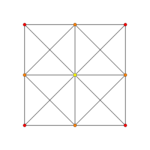
|
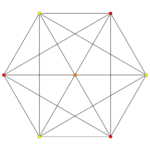
| |
| Dihedral symmetry | [4] | [3] |
Related uniform 6-polytopes
The rectified 6-simplex polytope is the vertex figure of the 7-demicube, and the edge figure of the uniform 241 polytope.
These polytopes are a part of 35 uniform 6-polytopes based on the [3,3,3,3,3] Coxeter group, all shown here in A6 Coxeter plane orthographic projections.
Notes
References
- H.S.M. Coxeter:
- H.S.M. Coxeter, Regular Polytopes, 3rd Edition, Dover New York, 1973
- Kaleidoscopes: Selected Writings of H.S.M. Coxeter, edited by F. Arthur Sherk, Peter McMullen, Anthony C. Thompson, Asia Ivic Weiss, Wiley-Interscience Publication, 1995, ISBN 978-0-471-01003-6 [1]
- (Paper 22) H.S.M. Coxeter, Regular and Semi Regular Polytopes I, [Math. Zeit. 46 (1940) 380–407, MR 2,10]
- (Paper 23) H.S.M. Coxeter, Regular and Semi-Regular Polytopes II, [Math. Zeit. 188 (1985) 559-591]
- (Paper 24) H.S.M. Coxeter, Regular and Semi-Regular Polytopes III, [Math. Zeit. 200 (1988) 3-45]
- Norman Johnson Uniform Polytopes, Manuscript (1991)
- N.W. Johnson: The Theory of Uniform Polytopes and Honeycombs, Ph.D.
- Klitzing, Richard. "6D uniform polytopes (polypeta)". https://bendwavy.org/klitzing/dimensions/polypeta.htm. o3x3o3o3o3o - ril, o3x3o3o3o3o - bril
External links
Fundamental convex regular and uniform polytopes in dimensions 2–10
| ||||||||||||
|---|---|---|---|---|---|---|---|---|---|---|---|---|
| Family | An | Bn | I2(p) / Dn | E6 / E7 / E8 / F4 / G2 | Hn | |||||||
| Regular polygon | Triangle | Square | p-gon | Hexagon | Pentagon | |||||||
| Uniform polyhedron | Tetrahedron | Octahedron • Cube | Demicube | Dodecahedron • Icosahedron | ||||||||
| Uniform 4-polytope | 5-cell | 16-cell • Tesseract | Demitesseract | 24-cell | 120-cell • 600-cell | |||||||
| Uniform 5-polytope | 5-simplex | 5-orthoplex • 5-cube | 5-demicube | |||||||||
| Uniform 6-polytope | 6-simplex | 6-orthoplex • 6-cube | 6-demicube | 122 • 221 | ||||||||
| Uniform 7-polytope | 7-simplex | 7-orthoplex • 7-cube | 7-demicube | 132 • 231 • 321 | ||||||||
| Uniform 8-polytope | 8-simplex | 8-orthoplex • 8-cube | 8-demicube | 142 • 241 • 421 | ||||||||
| Uniform 9-polytope | 9-simplex | 9-orthoplex • 9-cube | 9-demicube | |||||||||
| Uniform 10-polytope | 10-simplex | 10-orthoplex • 10-cube | 10-demicube | |||||||||
| Uniform n-polytope | n-simplex | n-orthoplex • n-cube | n-demicube | 1k2 • 2k1 • k21 | n-pentagonal polytope | |||||||
| Topics: Polytope families • Regular polytope • List of regular polytopes and compounds | ||||||||||||
 |

